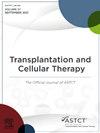NKTR-255与安慰剂相比,可增强复发/难治性(R/R)大b细胞淋巴瘤(LBCL)患者cd19靶向CAR-T治疗后的完全缓解和持久性
IF 3.6
3区 医学
Q2 HEMATOLOGY
引用次数: 0
摘要
cd19靶向嵌合抗原受体(CAR)治疗难治性大b细胞淋巴瘤(LBCL)有很高的应答率。然而,超过一半的患者未能达到缓解和/或复发。因此,需要提高CAR-T细胞产品功效的策略。NKTR-255是一种正在研究的聚合物偶联IL-15激动剂,可激活、增殖和扩增CD8+T细胞和NK细胞,并促进记忆性CD8+T细胞的产生。NKTR-255的临床研究显示,CAR-T和CD8+T细胞在先前接受CAR-T治疗(NCT04136756)的R/R NHL患者中扩增,并且CAR-T转运到肿瘤微环境(Muffly, 2024;NCT03233854)。在这里,我们描述了评估NKTR-255联合CAR-T治疗(NCT05664217)的2期试验结果。这是一项随机、双盲、安慰剂对照的2期研究,在fda批准的两种CAR-T产品(axicabtagene-ciloleucel或lisocabtagene-maraleucel)之一之后,NKTR-255与安慰剂进行对比。符合条件的R/R LBCL患者在CAR-T输注后14天开始静脉注射研究药物,最长可达5个月。主要终点是CD19-CAR-T细胞治疗后第6个月的完全缓解率(CRR)。根据Lugano的说法,通过PET-CT评估疗效。关键的次要和探索性目标包括安全性/耐受性,NKTR-255 PK和CAR-T PD,通过流式细胞术定量。结果15例LBCL患者于2023年3月至12月随机分组。所有患者均接受CD19-CAR-T细胞治疗和≥1剂量的研究治疗;12/15(80%)接受axial -cel治疗,3/15(20%)接受liso-cel治疗。共有11人被随机分配到NKTR-255组(5人1.5µg/kg;3在3µg/kg;其中3名在3µg/kg组,然后6µg/kg组(周期2+),4名随机分配到安慰剂组。两组之间的LDH和组织学相似,除了肿瘤负荷(NKTR-255中位数为1408,安慰剂为940 mm2)。CAR-T后的NKTR-255耐受性良好。在接受NKTR-255治疗的11例患者中,分别有2/11(18%)和3/11(27%)患者报告了输液相关反应(IRR)和发热;均为1/2级,24小时内消退。在1例患者中,NKTR-255最常见的≥3级TRAEs为中性粒细胞计数减少5/11(46%),血小板计数减少2/11(18%),淋巴细胞计数减少2/11 (18%);都解决了。根据意向治疗,NKTR-255第6个月的CRR为8/11(73%),而安慰剂组为2/4(50%)。根据可评估反应的分析,NKTR-255第6个月的CRR为8/10(80%),而安慰剂组为2/4(50%)。NKTR-255的CD8+CAR-T细胞再次扩增发生在8/11(73%)。额外的PD分析将被提出。结论初步数据显示,NKTR-255辅助CD19-CAR-T细胞治疗LBCL耐受良好,安全性好,6个月时的CR率优于单独CD19-CAR-T细胞治疗。NKTR-255辅助CAR-T治疗和其他细胞治疗的验证性研究是有必要的。本文章由计算机程序翻译,如有差异,请以英文原文为准。
NKTR-255 Vs Placebo to Enhance Complete Responses and Durability Following CD19-Directed CAR-T Therapy in Patients with Relapsed/ Refractory (R/R) Large B-Cell Lymphoma (LBCL)
Background
CD19-directed chimeric antigen receptor (CAR) have high response rates in refractory large B-cell lymphoma (LBCL). However, more than half of patients fail to achieve remission and/or relapse. Thus, strategies to improve efficacy of CAR-T cell products are needed. NKTR-255 is an investigational polymer-conjugated IL-15 agonist that activates, proliferates and expands CD8+T and NK cells, as well as promote creation of memory CD8+ T cells. Clinical studies with NKTR-255 have shown expansion of CAR-T and CD8+T cells in R/R NHL patients who previously received CAR-T therapy (NCT04136756), and CAR-T trafficking to the tumor microenvironment (Muffly, 2024; NCT03233854). Here, we describe results of a Phase 2 trial evaluating NKTR-255 in combination with CAR-T therapy (NCT05664217).
Methods
This is a phase 2 randomized, double-blind, placebo-controlled study of NKTR-255 vs placebo following one of two FDA-approved CAR-T products (axicabtagene-ciloleucel or lisocabtagene-maraleucel). Eligible patients with R/R LBCL received study drug intravenously starting +14 days following CAR-T infusion for up to 5 months. Primary endpoint was complete response rate (CRR) by blinded independent central review (BICR) at month 6 after CD19-CAR-T cells. Efficacy was assessed by PET-CT according to Lugano. Key secondary and exploratory objectives included safety/tolerability, NKTR-255 PK and CAR-T PD quantified by flow-cytometry.
Results
15 patients with LBCL were randomized between Mar and Dec 2023. All patients received CD19-CAR-T cell therapy and ≥1 dose of study treatment; 12/15 (80%) received axi-cel and 3/15 (20%) received liso-cel. In total, 11 were randomized to the NKTR-255 (5 at 1.5 µg/kg; 3 at 3 µg/kg; 3 at 3 µg/kg then 6 µg/kg cycle 2+) and 4 were randomized to placebo. LDH and histology were similar between both groups, except tumor burden (NKTR-255 median 1408 vs 940 mm2 placebo). NKTR-255 following CAR-T was well-tolerated. Among 11 who received NKTR-255, infusion-related reaction (IRR) and fever were reported in 2/11 (18%) and 3/11 (27%) pts, respectively; all were grade 1/2 and resolved in 24 hrs. The most common grade ≥3 TRAEs with NKTR-255 in >1 patient was decreased neutrophil count 5/11 (46%), platelet count 2/11 (18%), and lymphocyte count 2/11 (18%); all resolved. Per intent-to-treat, the CRR at month 6 for NKTR-255 was 8/11 (73%) vs 2/4 (50%) with placebo. Per response-evaluable analysis, CRR at month 6 for NKTR-255 was 8/10 (80%) vs 2/4 (50%) with placebo. Re-expansion of CD8+CAR-T cells occurred in 8/11 (73%) for NKTR-255. Additional PD analyses will be presented.
Conclusions
Preliminary data of NKTR-255 adjuvant to CD19-CAR-T cell therapy in LBCL was well-tolerated, safe and demonstrated superior CR rate compared to CD19-CAR-T cell therapy alone at 6-months. Confirmatory studies with NKTR-255 adjuvant to CAR-T therapy and other cellular therapies are warranted.
求助全文
通过发布文献求助,成功后即可免费获取论文全文。
去求助
来源期刊

Transplantation and Cellular Therapy
Medicine-Hematology
CiteScore
7.00
自引率
15.60%
发文量
1061
审稿时长
51 days
 求助内容:
求助内容: 应助结果提醒方式:
应助结果提醒方式:


